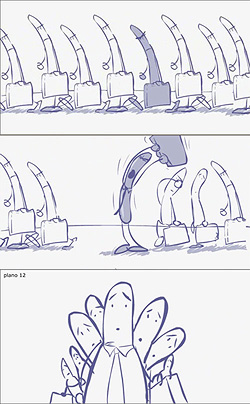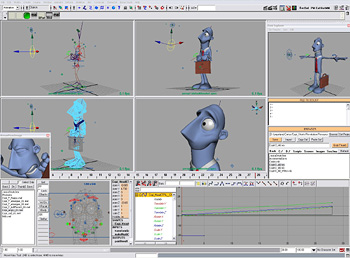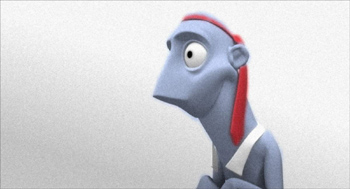Spanish animator and head of Pepe-School-Land Daniel Martínez Lara talks about the making of the short film Changes.

Martínez Lara became interested in 3D animation while he was studying filmmaking, and afterwards ended up working for a while at renowned Spanish company REM Infográfica (which was founded in 1996 by Javier Reyes, José María de Espona and Jorge Martínez Reverte). At that time he started producing his own short films and created the character Pepe, who would later show up in various issues of 3DWorld magazine. Copi, the main character of “Changes”, is related to Pepe in many ways and follows the same minimalist aesthetic (Pepe was originally conceived in plasticine, and maintains a certain likeness to the material).
The Interview
What motivated you to start working on “Changes”?
After doing freelance jobs for a couple of years and spending another three working at Ilion Studios every cell of my body was screaming at me to start working on a short film, ideas kept piling up in my head. I had been doing a few tests and animations, but I felt that it wasn’t enough; I wanted to tell a story with a beginning and an end.
How did the script come about?
Of all the ideas I was considering, the one that I liked the most and felt was more approachable from a practical point of view, was an idea from a comic book by Quino (Ed. Note: "Quino" is the signature name for Argentine humorist Joaquín Lavado). I found an idea that I thought was very appealing to turn into an animation.
When was the first time you got to read a book by Quino?
Well, that happened due to my older brothers (there’s six of us), and it was a book of Mafalda. I recall that I enjoyed reading it, but that was pretty much it. When I really began admiring Quino was when I got older, and discovered the other books by Quino, those that don’t focus on any particular character and deal with the more general subject of the human condition from a surrealistic and cynical point of view.
Quino is without a doubt an acute observer of human nature and the distortions produced by the "modern world". Why did you feel identified with the themes you’ve chosen for your short among all the ones that Quino deals with?
Because it’s a subject that hits too close to home, something I’ve given a lot of thought to; follow a path laid by others or choose to create your own. I’ve reached the conclusion that both possibilities in life are equally good, as long as one makes his choice freely and in a conscious way, and that’s what the short film is about. Sometimes we think that we are choosing, that we are actually changing something, but after a while we realize that we have only managed to make superficial changes. And after the novelty wears away, everything remains the same.
Which other sources of inspiration have influenced your work, besides Quino?
I really enjoy the classic animated cartoons from Warner Bros., they have a certain cynicism that I like a lot. I also enjoy the work of French comic artist Edika.
Why did you choose to continue using a non-realistic, minimalist aesthetic ("expressive simplicity" according to your own words) in "Changes".
Because that economic aesthetic allows me to focus on the story and characters, which is what I’m really interested in. It’s a legacy from comic artists, they only tend to draw elements that are relevant to a story. I think it’s important to know how to identify those elements and once you have them all that you choose to add afterwards will be of great help to embellish the story, but not essential.
How did you go about finding the music for the short? What led you to Wim Mertens’ compositions?
Once I was working on the storyboard, I began to "open my ears" in order to find the music for the short. During my search I remembered listening to Wim Mertens’ work and I recalled that he had certain musical pieces that could fit nicely with "Changes". So much so that I found three musical scores that complemented the short well, but I had to settle on one. I discarded the one I found less promising but it was difficult to pick between the two left. I liked them both, the two of them contributed different things to the visuals, one being lighter, the other more intense. After much pondering on the issue and carrying out a survey among family and friends that didn’t help much in clarifying things, I decided to post both versions on the Net and let people vote for their favorite. And that’s what I did. The lighter version won with 75% of the votes, so that was the final choice.
Why did you choose not to add other sounds to the musical score by Mertens?
I did try, but I didn’t like the results at all. I felt it had a distracting effect, though I probably didn’t do it with much enthusiasm and was a bit inclined to not liking the outcome. Truth is, from the very beginning I imagined it as having only a musical score.
How has your animation production process evolved since your first shorts with the Pepe character?
It’s completely different when comparied to my earlier shorts. Having worked for almost three years on the script and production process of the animated feature "Planet One" at Ilion Studios has forever changed my approach to film production. I’d say that now I put a lot more effort in elaborating the central concept of the short and do a more thorough job at planning directing tasks. My previous shorts were essentially visual gags which progressed as I advanced with the development of the short itself. It’s a fresh approach towards this kind of work, but the problem is that you aren’t quite sure of where you are headed, and the idea for the short film can easily end up watering down. There wasn’t a true script being developed for the shorts.
In this last short I’ve felt that I was in full control of the steering wheel, I invested lots of time in planning, creating, and communicating the story. Javier Moya, an old student of mine who currently works as lead animator at Ilion Studios, was an invaluable help. We spent many hours discussing concepts. It’s absolutely essential to have someone with whom you can discuss ideas; someone that can contribute his own, that can ask uncomfortable questions. This short film would certainly have been much worse without those conversations.
What have you learned from the production of "Changes"?
Personally, this is the short film I’m the happiest with, I think it’s the most polished one up to date. Without leaving the audience in a knock-out state, it manages to transmit something and hopefully it does it in an entertaining way. It’s a short film which doesn’t suffer as much from a "void date" as previous shorts I’ve made such as the one called "Pepe" (that has a robot and a table) which is one of the best known. That short lost much of its original impact as time passed because it consists mainly of a gag rendered with "global illumination", and once this technique was adopted and surpassed what remained was the story itself. (Ed. note: Martínez Lara refers to a short he made that promoted Marcos Fajardo’s development of the Arnold renderer)
How has the Internet influenced the production process of "Changes"?
The Internet is a wonderful thing, I’m still fascinated by the fact that a person from the other side of the planet can show his or her work all around the world without leaving home.
It’s a window through which you can watch others, as others watch you. In the particular case of "Changes" it enabled me to carry out the survey to see which musical score was preferred by the audience and above all to be able to make the short film known.
Due to the quality and wide distribution of your work, you have probably received various offers to work abroad. Many Spanish artists have tried their luck in this respect. Why did you choose to remain in Spain?
Yes, there have been some offers, and very, very tempting ones. But they were exclusively for working as an animator and I personally don’t consider myself to be a good animator; there are many animators that are better than me. What I really like is to tell stories and connect with an audience. I haven’t felt the need to leave Spain in order to make my shorts and accomplish what I wanted to do in this respect. Besides, now that I am working on the Pepe-school-land project, I’ll need to stay in Spain for quite a while.
What do you like most about Spanish culture (or about Spain itself)?
Spain is a wonderful place to live in, and even more so if you happen to live in beautiful Barcelona like I do. Spain is a very diverse country where many cultures coexist. For example, there are three official languages besides Spanish.
Many thanks to Daniel Martínez Lara for answering our questions.
Images are Copyright © Daniel Martínez Lara. Provided courtesy of the author.
Don’t miss
Director's site
Link
Pepe-School-Land (Martínez Lara's animation school)
Link
Alike - Martínez Lara's related short film
Link

















Recent Comments